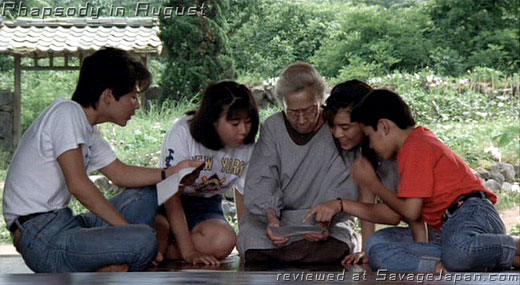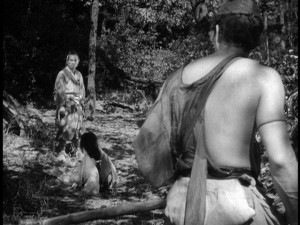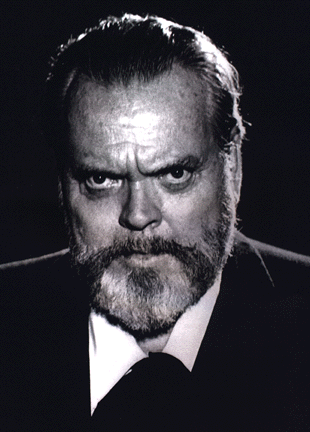This appeared in the Chicago Reader (February 21, 1992), and is reprinted in my 1997 collection Movies as Politics. — J.R.

RHAPSODY IN AUGUST
*** (A must-see)
Directed and written by Akira Kurosawa
With Sachiko Murase, Hisashi Igawa, Mie Suzuki, Tomoko Ohtakara, Mitsunori Isaki, Hidetaka Yoshioka, and Richard Gere.
Next month, Akira Kurosawa will be celebrating his 82nd birthday. Having long outlived the two other supreme masters of the Japanese cinema — Kenji Mizoguchi, who died in 1956, and Yasujiro Ozu, who died in 1963 — he bears the handicap of living on in an era that clearly seems remote and alien to him, despite the fact that his work has enjoyed much more currency in the 80s and early 90s than that of any of his near-contemporaries.

I’ve always been somewhat slow to appreciate the mastery of Kurosawa in relation to the works of Mizoguchi and Ozu, perhaps in part because I started off on the wrong footing. The first Kurosawa film I ever saw was Rashomon (1950), the single movie that was most responsible for introducing the western world to the Japanese cinema, and, as it happens, I saw it as a teenager only after reading the two short stories by Ryunosuke Akutagawa that it was based on. Read more


It’s obvious by now that David Thomson is never going to relinquish his unwarranted and unvarying baseline assumption about Orson Welles (see his column in today’s Guardian) that he was a failure whose life and career consisted of nothing but “decline”. Why? Because what Thomson means by success is precisely what he’s achieved himself: uncontroversial popularity and acclaim, taking popular and comforting positions that irritate no one except for a few diehards like me. If failure actually means failure to tell people what they already think and failure to support what they already believe, then I can only agree — Welles was a failure through and through. Unlike Thomson, a glorious success whose career can be described only as continuous ascent into the stratosphere. If only Welles could have turned himself into a David Thomson, goes the apparent assumption, then everybody would be happy. [10/23/09]
Postscript (10/25/09]: In a state of relative calm, I’ve just reread Thomson’s column, and can see that, okay, he’s trying to imply that Welles might have conceivably been happy when he died even without having millions in the bank. Fair enough. But his insufferable pose of pseudo-knowingness about matters he knows little or nothing about, which also suffuses every page of his Welles biography, continues to gall me.”He Read more

Posted Fri, Dec 8, 2006 at 11:21 AM

It’s interesting to see how some of the most difficult and challenging examples of art cinema have become increasingly popular over the past decade. Back in the 60s and 70s, Robert Bresson was virtually a laughing-stock figure to mainstream critics, and someone whose films characteristically played to almost empty houses. Yet by the time that he died, a retrospective of his work that circled the globe was so successful in drawing crowds that in many venues—including Chicago’s Film Center — it had a return engagement. Much the same thing has happened with Andrei Tarkovsky — another uncompromising spiritual filmmaker, and one whose films are even tougher to paraphrase or even explain in any ordinary terms.

I’m just back from a trip to the east coast where I was gratified to find, when I turned up to introduce a screening of Jacques Rivette’s 252-minute L’amour fou (1968) in Astoria’s Museum of the Moving Image, that the film was playing to a nearly packed house. (Incidentally, this galvanizing love story about the doomed relationship between a theater director and his wife, played by Jean-Pierre Kalfon and Bulle Ogier, has never looked better to me, though I’ve been a big fan since the early 70s.) Read more







